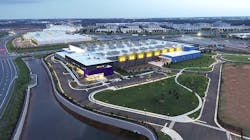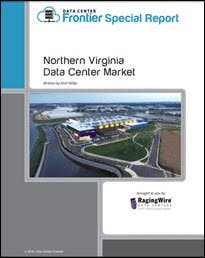Northern Virginia Data Center Market Approaches 1 Gigawatt
With the latest info on the always-growing Northern Virginia colocation market, we continue our series of stories on the leading geographic markets for data center space. Data Center Frontier is partnering with datacenterHawk to provide in-depth market reports on each city we profile. This time, we revisit the Northern Virginia Data Center Market, the home of the cloud. The first entry in our new series explores what makes this data center market stand out from the pack.
Download the full report.
Northern Virginia is the focal point for the explosive growth of cloud computing, which has made the region the largest and most active data center market in the United States. It is currently undergoing an extraordinary data center building boom, the likes of which the industry has never seen.
As the primary on-ramp for major cloud computing platforms, Northern Virginia is experiencing powerful growth, as the leading data center REITs and colocation providers race to provide capacity for fast-growing cloud service providers and the digital businesses that seek to connect to these clouds.
The Northern Virginia data center market is spread across a number of towns in Loudoun, Prince William and Fairfax counties, and shows signs of expanding into adjacent counties. At the heart of the region’s geography and success is Ashburn, which has become known as “Data Center Alley” for its concentration of mission-critical facilities. Ashburn sits atop the world’s densest intersection of fiber networks, making it an ideal location to store and distribute data. It is unique in its connectivity, and its data centers are laying the physical foundation of the digital economy.
Northern Virginia is the largest market for data center space in the U.S., home to 4.7 million square feet (SF) of commissioned data center space, representing 955 megawatts (MW) of commissioned power, according to market research from datacenterHawk. Demand for space is very strong, as reflected in the vacancy rate of just 4.4 percent in the region.
Leasing in the balance of 2018 is expected to push Northern Virginia above 1 gigawatt of commissioned space, making it the first data center market to cross that milestone. While extraordinary, reaching the gigawatt level in commissioned power has been fully expected. Dominion Power said this year that it is now delivering a gigawatt of power to Northern Virginia’s data centers, and Amazon Web Services has gained approvals for more than 1 gigawatt of generator capacity to support its current and future data center needs in the region.
Northern Virginia is the world’s largest data center market, home to 4.7 million square feet (SF) of space, representing 955 megawatts (MW) of commissioned power. The volume of data center capacity in the planning phase in Northern Virginia has reached 1,097MW—that’s 1.1 gigawatts.
In early 2018, Northern Virginia has seen unprecedented levels of data center leasing, record valuations for land in Data Center Alley, and a surge in “land banking” as developers seek to lock down space for future expansion in this region, which has strategic importance for enterprise customers as well as hyperscale players. Northern Virginia continues to see demand for traditional colocation space for enterprises, content companies, IT integrators and government agencies.
The latest numbers on market growth are mind boggling by historical standards. Here are some data points:
- According to datacenterHawk, 157MW of commissioned data center capacity was either absorbed or pre-leased in Northern Virginia in the second quarter of 2018, easily exceeding the industry record of 115 MW for an entire year—which was established in 2017 in Northern Virginia.
- A single tenant signed a pre-lease for 72MW of capacity with CloudHQ, which is the largest deal in the history of the data center industry, more than doubling the 35MW leased by the anchor customer in CloudHQ’s Manassas MCC1 project in 2016.
- The volume of data center capacity in the planning phase in Northern Virginia has reached 1,097MW—that’s 1.1 gigawatts. This is partially driven by new players entering the market, but also includes major expansions by experienced players.
The benefits of the cloud boom in Northern Virginia are beginning to spread beyond Ashburn, with a flurry of new projects in Manassas, as well as data center campuses in Arcola in southern Loudoun County and Leesburg to the West. The new frontier is Fauquier County, where developers are prepping several sites optimized for hyperscale customers. In almost all of these new sub-markets, the first mover is Amazon Web Services, which continues to add capacity to its US-East cloud region in Northern Virginia.
What’s driving this trend? Strong demand for data center sites has driven up the price of land in Ashburn, where development sites are becoming scarcer. An example is the recent sale of a prime property in the heart of Data Center Alley for more than $1.7 million per acre, well above the previous published high of $1.3 million for data center property in Ashburn.
Getting Taller, Spreading Out
In 2018 and beyond, the biggest question facing the Northern Virginia market is whether the supply of data center space can keep pace with leasing demand. Data center developers are responding to the surge in demand by accumulating property (“land banking”) and building larger campuses.
Two trends are emerging in Ashburn—developers are building taller data centers to maximize the sellable space on each acre of land, and also buying office or industrial properties and then demolishing existing structures to make way for data centers. These trends will continue to influence the evolution of Data Center Alley for years to come.
Meanwhile, developers are increasingly looking beyond Ashburn to locations elsewhere in Loudoun and Prince William counties and beyond.
In 2018 and beyond, the biggest question facing the Northern Virginia market is whether the supply of data center space can keep pace with leasing demand.
Many of the trends that have shaped the data center industry have emerged first in Northern Virginia, which began as a retail colocation market, but has since seen early adoption of wholesale data suites, “super wholesale” leases spanning multiple data halls, and now build-to-suit hyperscale cloud facilities.
As a result, the Northern Virginia market provides an unusual number of market niches for service providers, and options for customers seeking space. A key trend to watch is the growing gap between hyperscale and enterprise requirements, and whether this market segmentation prompts providers to focus on one of these niches or compete across all sectors.
RagingWire has three large data centers in Ashburn, and is continuing to build on a new 78-acre campus which can accommodate seven buildings. (Image: RagingWire Data Centers)
What’s So Hot About Northern Virginia?
Northern Virginia is the largest data center market in the United States. This extremely mature and well-connected area traces its roots to the U.S. Government’s experiments in wide area fiber optic networking in the late 1960s. The low-latency connections to the national fiber network backbone, along with a relatively business-friendly environment, make Northern Virginia the top market for data centers serving the area’s biggest public and private enterprises.
The Virginia economy is diverse, with both a strong manufacturing base (producing everything from wood flooring to rocket engines) and information services sector. Over 70 firms with annual revenue over $500 million are headquartered in Virginia. In the past 10 years, more than 7,500 new jobs and investments of over $7 billion have been announced in Virginia’s data center industry. While downtown Washington, DC has several smaller data centers, the bulk of data center investment occurs outside of the downtown area. Concentrations of colocation, cloud, and enterprise data centers are located in several cities in Northern Virginia, including Ashburn, Sterling, Manassas and Reston.
The first phase of Building L on Digital Realty’s campus in Ashburn, Virginia. (Photo: Digital Realty)
The Ashburn area (a suburb north of Dulles Airport so dense it is commonly referred to as “Data Center Alley”) is dominated by large data center providers. Digital Realty continues to develop its campus located on Loudoun County Parkway. The site is supported by a dedicated substation capable of producing up to 150MW of power. They also purchased DuPont Fabros, adding seven data centers in Ashburn. In addition, Equinix has continually invested in the Northern Virginia market by building nine data centers in the area, and has secured land to continue to expand.
RagingWire has three large data centers in Ashburn, and is continuing to build on a new 78-acre campus which can accommodate seven buildings.
Approximately one mile to the southeast is Sterling, an area with a significant number of data center providers as well. CyrusOne, Cyxtera and Digital Realty are well positioned to be competitive in this area for the immediate future. Infomart Data Centers has recently opened its 180,000 SF former AOL data center in Sterling, which it purchased in 2014. Reston continues to grow as well, with significant investments from CoreSite.
While government agency requirements have increased the data center demand in Northern Virginia, the market includes many other industries as well. Aerospace, financial, managed hosting, technology, and telecommunications companies have all staked claims in Northern Virginia’s data centers. Colocation requirements in the Northern Virginia market are typically larger than most markets. This is due to the nature of the requirements as well as the availability and competitive pricing in the market.
Ashburn: Background and History
Why is Ashburn, which lies about 30 miles west of Washington in Loudoun County, such an important site? It was home to MAE-East, the Internet’s first major interconnection point. As a startup, Equinix built its first data center in Ashburn in 1998, providing a “carrier-neutral” facility where companies’ networks could tap into Internet backbones.
Data center projects have been welcomed in Northern Virginia due to their positive impact on the economy.
The Equinix campus quickly become the Web’s busiest meeting place, creating a powerful network effect in which each new connection adds to the value of its digital ecosystem. As the primary Internet on-ramp, the Equinix campus in Ashburn has become the geographic focus of activity in Northern Virginia, with new data center projects springing up on adjacent land.
Equinix has opened DC12, the first facility on its huge new data center campus in Ashburn, Virginia. (Photo: Equinix)
Proximity to Equinix continues to shape the market for data center real estate in Loudoun County. In recent years, data center developers and service providers have bought up most of the parcels of open land near the main Equinix campus, providing runway for future capacity in this high-growth market.
Loudoun County has been recognized for its support of the data center industry, coordinating available land and working closely with applicants on zoning and streamlining approvals and fees. Prince William County has developed similar services for a 10,000- acre “data center opportunity zone.”
Data center projects have been welcomed in Northern Virginia due to their positive impact on the economy, which was documented in a 2014 study from Mangum Economics. The study showed that the data center industry employed 12,533 workers in Virginia in 2014, with an average annual income of $105,942. The study also found that Virginia has seen a strong return on its investment. Every dollar invested in data center incentives provides $9.50 in tax revenue to Loudoun County, and $4.30 to Prince William County, the study concluded.
Nonetheless, there have been tensions around the pace of data center expansion in several areas, most notably in Haymarket in Prince William County and some areas of western Loudoun County.
The latest Data Center Frontier series on the Northern Virginia Data Center Market will also cover the following topics for the region in the coming weeks:
- Trends in Demand
- Trends in Supply
- Business Environment
Download the full Data Center Frontier “Northern Virginia Data Center Market” special report, courtesy of RagingWire Data Centers.
About the Author



